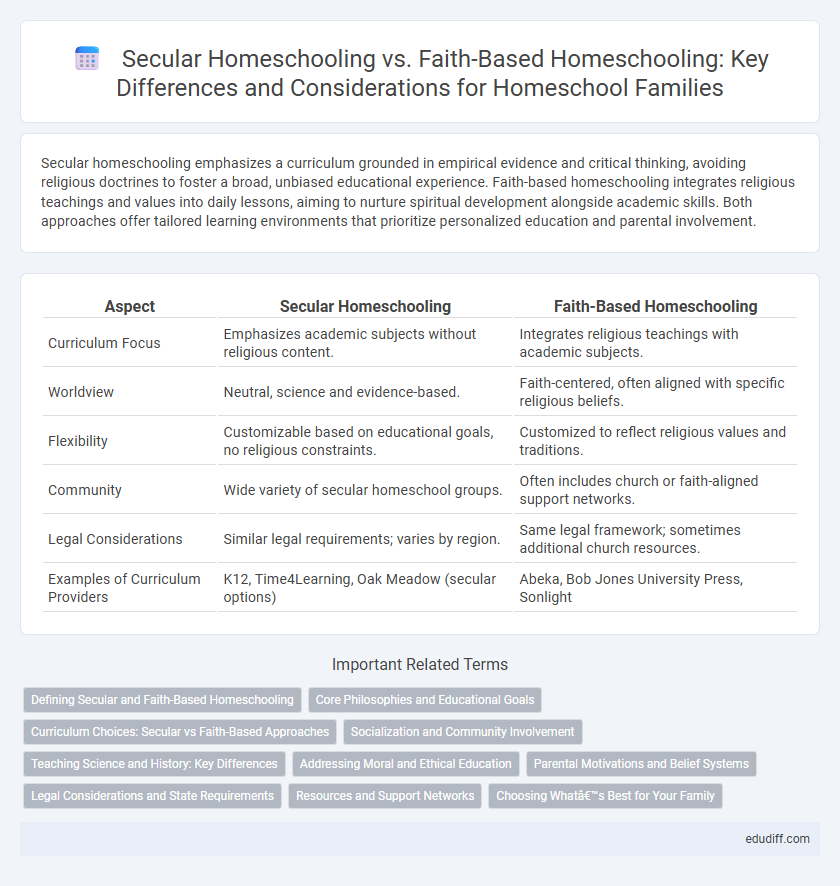Secular homeschooling emphasizes a curriculum grounded in empirical evidence and critical thinking, avoiding religious doctrines to foster a broad, unbiased educational experience. Faith-based homeschooling integrates religious teachings and values into daily lessons, aiming to nurture spiritual development alongside academic skills. Both approaches offer tailored learning environments that prioritize personalized education and parental involvement.
Table of Comparison
| Aspect | Secular Homeschooling | Faith-Based Homeschooling |
|---|---|---|
| Curriculum Focus | Emphasizes academic subjects without religious content. | Integrates religious teachings with academic subjects. |
| Worldview | Neutral, science and evidence-based. | Faith-centered, often aligned with specific religious beliefs. |
| Flexibility | Customizable based on educational goals, no religious constraints. | Customized to reflect religious values and traditions. |
| Community | Wide variety of secular homeschool groups. | Often includes church or faith-aligned support networks. |
| Legal Considerations | Similar legal requirements; varies by region. | Same legal framework; sometimes additional church resources. |
| Examples of Curriculum Providers | K12, Time4Learning, Oak Meadow (secular options) | Abeka, Bob Jones University Press, Sonlight |
Defining Secular and Faith-Based Homeschooling
Secular homeschooling emphasizes a curriculum free from religious influence, focusing on scientific reasoning, critical thinking, and evidence-based learning across subjects like math, science, and history. Faith-based homeschooling integrates religious teachings and values into academic studies, often aligning lessons with specific doctrines or spiritual perspectives. Both approaches offer tailored educational experiences, catering to families' preferences for either a secular framework or a faith-centered worldview.
Core Philosophies and Educational Goals
Secular homeschooling emphasizes critical thinking, scientific inquiry, and a curriculum free from religious doctrine, aiming to cultivate independent reasoning and a broad understanding of diverse worldviews. Faith-based homeschooling centers on religious teachings and moral development, integrating scripture and spiritual principles throughout educational content to reinforce specific doctrinal values. Both approaches prioritize personalized learning but differ fundamentally in their core philosophies and educational goals, shaping students' perspectives and intellectual foundations.
Curriculum Choices: Secular vs Faith-Based Approaches
Curriculum choices in secular homeschooling often emphasize science, history, and literature from a non-religious perspective, prioritizing critical thinking and evidence-based learning. Faith-based homeschooling integrates religious teachings and values across subjects, embedding scripture and spiritual principles into daily lessons. Both approaches offer tailored educational experiences that reflect family beliefs and learning goals.
Socialization and Community Involvement
Secular homeschooling often emphasizes diverse socialization opportunities through community groups, co-ops, and extracurricular activities that foster inclusive and varied interactions. Faith-based homeschooling tends to center socialization within church communities and religious gatherings, promoting shared values and spiritual growth. Both approaches offer unique pathways for community involvement, with secular methods prioritizing broad societal engagement and faith-based models focusing on faith-centered relationships.
Teaching Science and History: Key Differences
Secular homeschooling emphasizes evidence-based science education and presents history through a fact-driven, unbiased lens, often incorporating multiple perspectives and current academic research. Faith-based homeschooling integrates religious beliefs into science and history curricula, interpreting scientific concepts and historical events through doctrinal views, which can influence topics like evolution and cultural narratives. These distinct approaches impact curriculum choices, educational resources, and the development of critical thinking skills in students.
Addressing Moral and Ethical Education
Secular homeschooling emphasizes teaching moral and ethical principles through critical thinking, secular philosophies, and universally accepted human values, promoting inclusivity and open inquiry. Faith-based homeschooling integrates religious doctrines and biblical teachings to shape students' character and ethical frameworks, fostering spiritual growth alongside academic learning. Both approaches aim to develop strong moral foundations but differ fundamentally in source and method of ethical instruction.
Parental Motivations and Belief Systems
Parental motivations for secular homeschooling often center around a desire for a customizable, unbiased curriculum that emphasizes critical thinking and scientific inquiry, while faith-based homeschooling prioritizes imparting religious values and moral teachings aligned with specific belief systems. Secular homeschoolers typically advocate for intellectual freedom and diversity of perspectives, whereas faith-based families emphasize spiritual development and adherence to doctrinal principles. Both approaches reflect deeply held convictions about the role of education in shaping a child's worldview and character.
Legal Considerations and State Requirements
Secular homeschooling and faith-based homeschooling differ significantly in legal considerations and state requirements, with secular programs often adhering strictly to standardized curriculum and assessment mandates to satisfy state education laws. Faith-based homeschooling may benefit from exemptions or alternative compliance options due to religious freedom protections under laws such as the First Amendment and specific state statutes like the Religious Freedom Restoration Act. Families must review their state's homeschooling regulations, which vary widely, to ensure proper registration, reporting, and curriculum approval processes are followed regardless of the homeschooling approach chosen.
Resources and Support Networks
Secular homeschooling offers a diverse array of resources including scientific curricula and critical thinking materials, often supported by community groups that emphasize academic freedom and inclusivity. Faith-based homeschooling provides specialized religious content alongside standard subjects, bolstered by faith-centered support networks that foster spiritual growth and shared values. Both approaches benefit from extensive online forums, local co-ops, and specialized conferences tailored to their distinctive educational philosophies.
Choosing What’s Best for Your Family
Choosing between secular homeschooling and faith-based homeschooling depends on your family's core values and educational goals. Secular homeschooling often emphasizes a broad, evidence-based curriculum without religious content, ideal for families seeking academic flexibility and diverse perspectives. Faith-based homeschooling integrates spiritual teachings with academics, catering to families wanting to reinforce their religious beliefs while educating their children at home.
Secular Homeschooling vs Faith-Based Homeschooling Infographic

 edudiff.com
edudiff.com